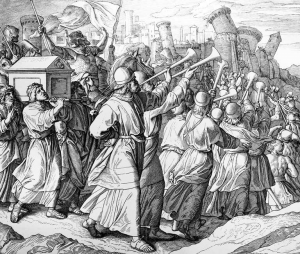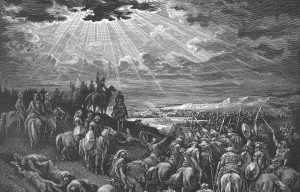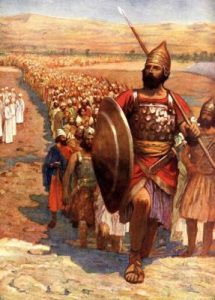
Shownotes
Welcome to Day 1556 of our Wisdom-Trek, and thank you for joining me.
I am Guthrie Chamberlain, Your Guide to Wisdom
Holy War – Worldview Wednesday
Welcome to Wisdom-Trek with Gramps! Wisdom is the final frontier in gaining true knowledge. Our mission is to create a legacy of wisdom, seek out discernment and insights, and boldly grow where few have chosen to grow before. Hello, my friend; this is Gramps; thanks for coming along on our journey to increase Wisdom and Create a Living Legacy. Today is Day 1556 of our Trek, and it is Worldview Wednesday. Creating a Biblical Worldview is essential to have a proper perspective on today’s current events. To establish a Biblical Worldview, you must have a proper understanding of God and His Word. This week, we will continue reviewing the book from Dr. Michael S Heiser titled “Supernatural.” The book is an abbreviated version of his more comprehensive book, “The Unseen Realm.” I highly recommend both of these books. Creating a Biblical Worldview based on how the Old and New Testaments connect with God’s overall plan for humanity is essential. This book review will help us understand what the Bible teaches about the unseen world, and why it matters.
Holy War
The Bible is a controversial book. People who don’t see it as the Word of God often object to what it says. But some parts of the Bible make even Christians uncomfortable. Israel’s war to conquer the Promised Land is a case in point. Why? Mostly because of the killing. It seems indiscriminate and far too thorough. Why was it necessary to kill entire populations in some cities—men, women, children, and even livestock? Why not let the inhabitants surrender? Wouldn’t it be better to exile them than to slaughter them?
There’s an answer to those objections—but I’ve discovered that the answer seems to make Christians as uncomfortable as the problem. You can only understand the rationale and motive of the conquest accounts when you see them through the supernatural worldview of an Israelite.
Israel’s Supernatural Logic
The battles for the Promised Land were framed by two factors, both deeply rooted in Israel’s understanding of their world as not only the abode of humankind but also the prize in an unseen spiritual war. We’ve talked about both of them already, but let’s review.
One factor is the fallout from the events at the Tower of Babel, when God decided, after the nations rebelled against him, that he no longer wanted a direct relationship with the people of those nations. Instead, he assigned members of his divine council, the sons of God, to govern them (Deuteronomy 4:19–20; 32:8–9). Afterward, he called Abraham and enabled him and his wife Sarah to have a child (Isaac), from whom the people of Israel would come.
We learned in Psalm 82 that these lesser gods became corrupt. They allowed injustice. People came to worship them instead of the Most High God. Thus, they became enemies of God and his people, Israel. Since some of those nations were within the land of Canaan, which God purposed to give to his nation Israel after the exodus, Moses and the Israelites believed the people who occupied those lands were their mortal enemies and their gods would do all they could to destroy Israel.
The second factor was even more frightening for the Israelites. It’s best explained by what happened when the Israelites arrived at the border of Canaan, the Promised Land.
Moses sent twelve spies into Canaan to report on the land and its inhabitants. The spies came back with evidence that the land itself was wonderful—it flows “with milk and honey”—just as God had told them (Numbers 13:27). But then ten of the spies dropped a bombshell in Numbers 13:32-33: “So they spread this bad report about the land among the Israelites: “The land we traveled through and explored will devour anyone who goes to live there. All the people we saw were huge. We even saw giants[nephilim] there, the descendants of Anak. Next to them, we felt like grasshoppers, and that’s what they thought, too!”
We’ve talked about the Nephilim before. They were the sinister spawn of the sons of God and the daughters of humankind back in Genesis 6:1–4. The Anakim giants the Israelite spies saw in Canaan were their descendants. There were more of them scattered throughout the land of Canaan, among the nations and cities the Israelites would have to defeat to take the land (Numbers 13:28–29). The task of conquering the land and its gods had seemed difficult before; now, it looked downright impossible. Now to take the land, they would have to face warriors of abnormal physical size.
Only two of the spies—Joshua and Caleb—believed God would help the Israelites defeat the Anakim. The rest persuaded the people they would lose. Instead of trusting that God—the same God who had devastated Pharaoh and his army so thoroughly—would intercede to give them the victory, they whined, “We can’t go up against them! They are stronger than we are!” (Numbers 13:31).
God replied in Numbers 14:11, “And the Lord said to Moses, “How long will these people treat me with contempt? Will they never believe me, even after all the miraculous signs I have done among them?” God was so angry that he threatened to disinherit Israel—the very thing he had done to the nations back at the Tower of Babel—and start over yet again, this time with Moses, Numbers 14:12 “I will disown them and destroy them with a plague. Then I will make you into a nation greater and mightier than they are!”
Moses begged God to relent (Numbers 14:13–19). God did, but he couldn’t overlook the unbelief of the people. A lesson had to be learned. It would be harsh. He told Moses in Numbers 14:20-31: Then the Lord said, “I will pardon them as you have requested. But as surely as I live, and as surely as the earth is filled with the Lord’s glory, not one of these people will ever enter that land. They have all seen my glorious presence and the miraculous signs I performed both in Egypt and in the wilderness, but again and again, they have tested me by refusing to listen to my voice. They will never even see the land I swore to give their ancestors. None of those who have treated me with contempt will ever see it. But my servant Caleb has a different attitude than the others have. He has remained loyal to me, so I will bring him into the land he explored. His descendants will possess their full share of that land. Now turn around, and don’t go on toward the land where the Amalekites and Canaanites live. Tomorrow you must set out for the wilderness in the direction of the Red Sea.”
Then the Lord said to Moses and Aaron, “How long must I put up with this wicked community and its complaints about me? Yes, I have heard the complaints the Israelites are making against me. Now tell them this: ‘As surely as I live, declares the Lord, I will do to you the very things I heard you say. You will all drop dead in this wilderness! Because you complained against me, every one of you who is twenty years old or older and was included in the registration will die. You will not enter and occupy the land I swore to give you. The only exceptions will be Caleb, son of Jephunneh, and Joshua, son of Nun. “‘You said your children would be carried off as plunder.’ Well, I will bring them safely into the land, and they will enjoy what you have despised.”
To this point, God had been tolerant of the people’s complaints. Instead of being thrilled to no longer be bondservants in Egypt, they’d griped about the food they had to eat (Numbers 11:1–14; 31–35) and about God’s chosen leader, Moses (Numbers 12:1–16). But his patience had run out; this time, their unbelief would have a terrible cost. Israel would wander in the desert for forty years until all the adults who had not believed had died off.
A Second Chance

Israel would get a second chance at taking the Promised Land. Deuteronomy 2–3 chronicles how, during their forty years of wandering, the Israelites wound up in the territory on the other side of the Jordan River (called the “Transjordan”), to the east of the Promised Land. The Transjordanian lands were Edom, Moab, and Ammon, territories God had given to Lot’s descendants, Abraham’s nephew, and Esau, Jacob’s brother. The people who lived there were relatives of the Israelites … most of them, anyway. But there were others.
God had directed Moses to make this trip for a specific purpose. It wasn’t about visiting distant relatives. The Israelites eventually made their way into a region known as Bashan. The place had a terrifying reputation. In ancient literature outside the Bible, Bashan was known as “the place of the serpent.” Two of its major cities, Ashtaroth and Edrei, both mentioned in connection with this journey (Deuteronomy 1:4; Joshua 13:12), were considered gateways to the underworld realm of the dead. In the context of Israel’s supernatural worldview, God had led the Israelites to the gates of hell.
And that wasn’t all. God had brought the Israelites there to encounter two kings, Sihon and Og. Those two kings were Amorites (Deuteronomy 3:2–3; 31:4) and rulers of what the Bible calls the Rephaim. As Deuteronomy 2:11 ominously noted, the Anakim were “also counted as Rephaim.” God, through Moses, had led the people to another area occupied by the same sort of giants that had frightened the Israelite spies into unbelief years earlier (Numbers 13:32–33), the event that had caused the forty years of wandering.
Why had God brought them there? Because this confrontation was a foretaste of what would have to be done when the forty years had ended. Israel would eventually have to cross the Jordan to occupy the land God had given to them. God was testing his people. Would they believe and fight this time? If so, a victory would provide them with confidence and faith for what lay ahead.
The Israelites had turned tail years earlier. But this time, the story ended differently. As Moses said in Deuteronomy 2:33, 3:3, “The Lord our God gave [Sihon] over to us, and we defeated him and his sons and all his people.… The Lord, our God, gave into our hand Og also, the king of Bashan, and all his people, and we struck him down until he had no survivor left” The prophet Amos, recounting the confrontation in his own biblical book many years later, described the outcome this way: “[the Lord] destroyed the Amorite before them, whose height was like the height of the cedars and who was as strong as the oaks” (Amos 2:9).
It was a rough way to start their second chance. God demanded that they face their fears—the terrors that had cost them forty years of aimless wandering. They had the God who had parted the Red Sea on their side. It was time they remembered that.
“Devoted to Destruction”

Israel won the day against Sihon and Og. Here, we get our first taste of why the conquest of the Promised Land at times involved annihilation. The entire population of the cities that were home to the giant Rephaim were “devoted to destruction” (Deuteronomy 3:6). The goal was not revenge. The goal was to ensure the elimination of the Nephilim bloodlines. To the Israelites, the giant clan bloodlines were demonic, having been produced by rebellious, fallen divine beings. They could not coexist with a demonic heritage.
Time passed, and before the Israelites crossed the Jordan into Canaan, Moses died. The leadership passed to Joshua. He led many military campaigns in the Israelites’ conquest of the Promised Land, and those campaigns were guided by the two factors I noted earlier in this chapter: drive out the hostile enemy nations and, in the process, eliminate the giant clan bloodlines.
Viewed in that context, the conquest of the Promised Land was a holy war—a battle against the forces of darkness and enemies under the dominion of hostile gods the Bible says are real spiritual entities.
The logic of the conquest is summarized well in Joshua 11:21–22:
During this period, Joshua destroyed all the descendants of Anak, who lived in the hill country of Hebron, Debir, Anab, and the entire hill country of Judah and Israel. He killed them all and completely destroyed their towns. None of the descendants of Anak were left in all the land of Israel, though some still remained in Gaza, Gath, and Ashdod.
Why This Matters
Joshua’s campaigns were mostly successful, but not complete. A few giants escaped—and while that may not have seemed very important, it foreshadowed events to come. Some wound up in Gath. Gath became a Philistine city (Joshua 13:3) and was the hometown of Goliath at the time of King David (1 Samuel 17:4). Goliath wasn’t the only giant in Gath, either (1 Chronicle 20:5–8). Not all of those who had been “devoted to destruction” during the conquest of the Promised Land were destroyed, and the fact that the conquest didn’t accomplish all of its prime directives had consequences for the Israelites.
The book of Judges tells us the conquest was incomplete in other ways at the time Joshua died. It was never fully realized. The Israelites decided they’d done well enough and disobeyed God’s command to drive out the other nations. But partial obedience is disobedience.
The Israelites would spend centuries paying for their decision to stop short of God’s goals. The book of Judges reiterates an awful cycle: Israel was repeatedly overwhelmed by hostile nations, and believing loyalty to God was nearly extinguished. Things improved by the time of King David and his son, Solomon, but once Solomon was gone, Israel disintegrated into civil war and idolatry.
The glory of the conquest was overshadowed by epic failure. Defeat was snatched from the jaws of victory. God’s kingdom rule—his plan for a restored Eden—went down in flames. The supernatural worldview that emerged from Babel, with unbelieving nations under the dominion of evil gods, remained intact. Israel was defeated and scattered, and her Promised Land came under the rule of other gods and their peoples. This same worldview permeates the New Testament too. Paul uses terms like principalities, authorities, thrones, and powers to describe the forces of darkness. Each of those terms was used in antiquity to refer to geographical rule.
The cause of the Israelites’ failure was disobedience and faithlessness on the part of God’s people. Humans are weak. We might wonder why God bothers with us. But if we look back to Eden, we know why. God had committed himself to humanity. We are his imagers, and his earthly family. His original plan for ruling the earth included us. For God to cast aside human participation in his council rule on earth would send the message that he’s unable to make it work or that it was a bad idea, to begin with. God is not incapable of achieving his own goals. And as mentioned in an earlier chapter, he doesn’t make mistakes.
It was time for a new approach to the old problem of sin and failure. Humanity could not be trusted with reviving the Edenic kingdom rule. Only God himself could do what needed to be done. Only God could meet the obligations of his own covenants. But humanity would not be set aside. Instead, God would have to become human. God would have to fulfill the Law and the covenants himself and then take upon himself the penalty for all human failure. But pulling off that unthinkable solution meant that it would have to be kept secret from everyone, including the intelligent supernatural beings hostile to his purposes. That wasn’t going to be easy.[1]
That will finish our study for this week’s worldview Wednesday. Join us again next week as we continue building our Biblical Worldview. Tomorrow we will ponder another bit of wisdom from Gramps. So encourage your friends and family to join us and then come along with us tomorrow for another day of ‘Wisdom-Trek, Creating a Legacy.’

If you would like to listen to any of our past 1555 treks or read the Wisdom Journal, they are available at Wisdom-Trek.com. I encourage you to subscribe to Wisdom-Trek on your favorite podcast player so that each day’s trek will be downloaded automatically.
Thank you so much for allowing me to be your guide, mentor, and, most of all, your friend as I serve you through this Wisdom-Trek podcast and journal.
As we take this Trek together, let us always:
- Live Abundantly (Fully)
- Love Unconditionally
- Listen Intentionally
- Learn Continuously
- Lend to others Generously
- Lead with Integrity
- Leave a Living Legacy Each Day
I am Guthrie Chamberlain….reminding you to ’Keep Moving Forward,’ ‘Enjoy your Journey,’ and ‘Create a Great Day…Everyday’! See you Tomorrow!
[1] Heiser, M. S. (2015). Supernatural: What the Bible Teaches about the Unseen World—And Why It Matters. (D. Lambert, Ed.) (pp. 87–96). Bellingham, WA: Lexham Press.